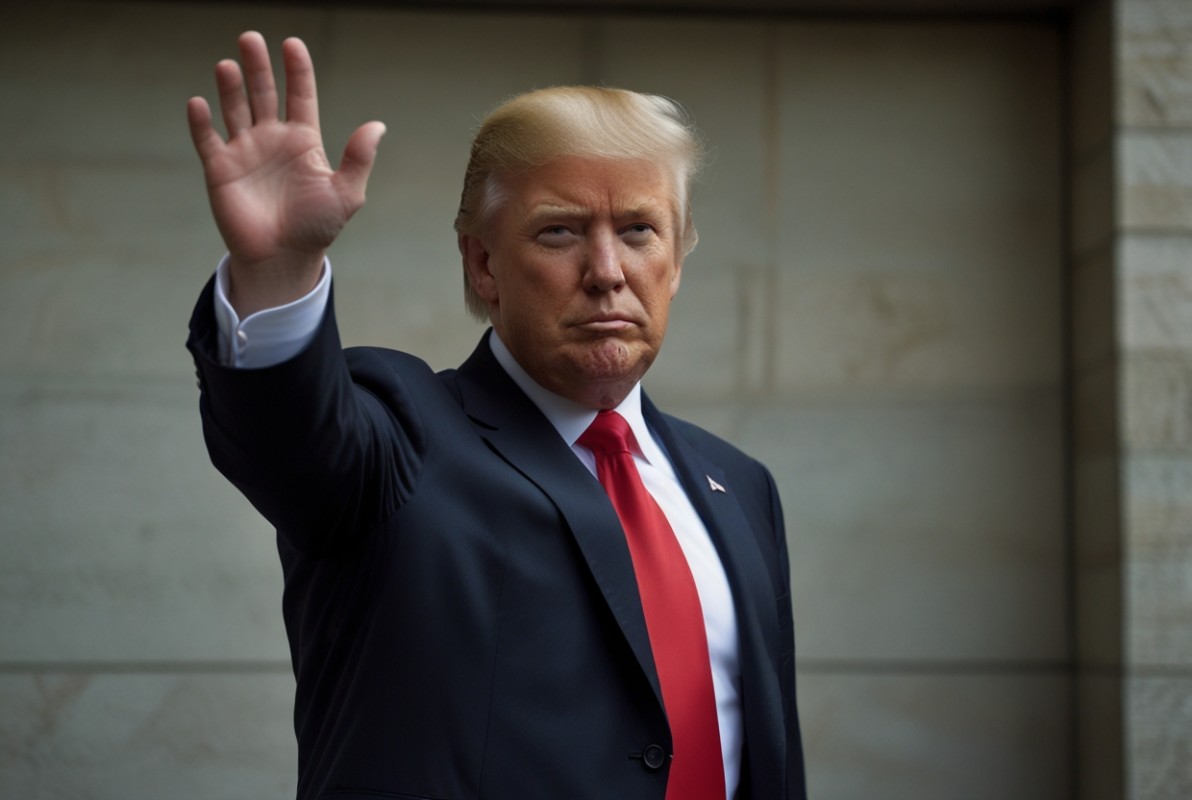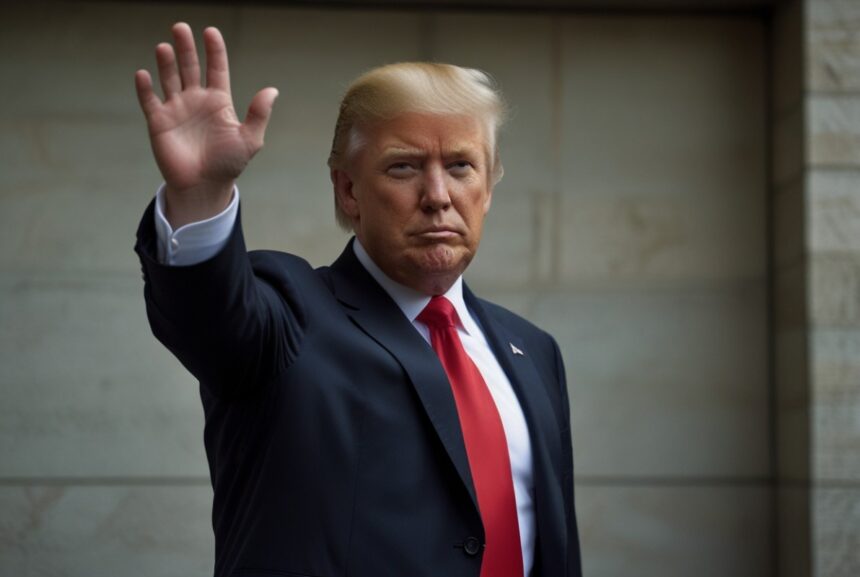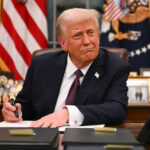
If you weren’t there, it would be hard to describe exactly how long and tortuous the line was to hear Donald Trump speak at the Bitcoin Conference. We waited hours to get through security and find a seat in the auditorium, and thousands of people competed for seats at the Nakamoto Stage from early in the morning. As the line snaked through the Expo grounds, it was easy to spot an even distribution of Bitcoin supporters and Trump supporters (some were both), all eager to hear Trump speak. The atmosphere was filled with excitement, and while I didn’t share that excitement, the air in Nashville certainly was. Our Uber driver was quick to point out that Trump would be speaking at the conference. Around the city, there were large images of Trump’s face plastered next to the Bitcoin symbol advertising the conference. Trump fever had certainly taken over the conference, but it seemed to have taken over the city of Nashville, too.
There’s no denying that having Donald Trump speak at a Bitcoin conference in an election year is a major “achievement.” This is a significant moment for Bitcoin, and in some ways we should all value this development as a milestone that we as Bitcoin users can be proud of. Trump’s speech promised to propel Bitcoin into the mainstream political debate, thereby normalizing an emerging digital currency that most still dismiss as “fake internet money.” This was a moment we should all remember for the rest of our lives. This was Bitcoin’s chance to be included in serious discussions by serious people.
If Trump had shown up to speak on time, we would have known an hour before that this was not going to happen. Instead, we waited. Once Trump began speaking, it didn’t take long for those who had been waiting for hours all day to realize that they had been fooled. Trump’s speech was a rambling, sometimes incoherent speech that only touched briefly on cryptocurrencies, and Bitcoin to boot. The first mention of Bitcoin came six and a half minutes into the speech. I don’t blame Trump for talking more about cryptocurrencies than Bitcoin. Most politicians do. But while speaking at the Bitcoin conference, I expected Trump to spend more time talking about Bitcoin than his genius uncle who worked at MIT. Alas, sometimes setting the bar too low is not enough.
The most concrete takeaway from listening to Trump talk about Bitcoin was the not-so-shockable realization that Robert Kennedy Jr. thinks more deeply about Bitcoin every morning over his first cup of coffee. This was deeper than Donald Trump has ever thought about Bitcoin in his entire life. All of Trump’s best moments during the speech (and there were a few) were lifted verbatim from Robert Kennedy Jr.’s keynote the day before. Here are the parts of the speech he didn’t copy from Robert Kennedy Jr.: Derogatory, arrogance, Pandering and Lack of informationWhat’s worth watching this speech is that the Bitcoin advocates I’m hearing from now on have made it easy to make a decision on just one issue.
No doubt there are plenty of bitcoiners who love Trump and enjoyed his speeches, but there are also a surprising number who see this whole thing as just another politician playing with money and votes. and A precarious situation in which the Bitcoin community is pandering for borrowed legitimacy. While having a presidential candidate discuss Bitcoin has some positive effects, the most serious people I know in the field recognize that it also carries risks and dangers. Chief among these dangers is that by approaching Trump, the Bitcoin community risks alienating its pre-coin-holding audience for the foreseeable future. I think this is hard to understand for those who already like Bitcoin and/or Trump. Keep in mind that most people don’t fit into either category.
I’ve been in the Bitcoin world publicly for so long that I understand the huge cognitive dissonance that exists among many Bitcoin users. Among these people are libertarians who are fully committed to individual freedom but are unwilling to respect a person’s gender identity. Among these people are conservatives who want government to be small while the government monitors which books it bans and what medical care people can get. Among these people are Bitcoin users who want the government to be cut off from the financial system while loudly cheering politicians who promise to buy Bitcoin on behalf of the U.S. government. If I can understand cognitive dissonance, why is it so difficult for a community that prides itself on being heterodox and skeptical and not trusting or verifying?
I have taken it very seriously and have taken it as a personal responsibility to give the Orange Pill to as many people as possible. 57% of Americans It is my job to get Trump haters to see Bitcoin as a force for good in this world. It has become even harder since the Nashville incident. Let’s be realistic. Bitcoin is the perfect combination of “internet” and “money” and should raise doubts in everyone’s eyes. There is no shortage of FUD disparaging Bitcoin as fake money, a scam, a Ponzi scheme, criminal money. Experienced Bitcoin users may not be concerned about that, but the pre-coin users I know are very conscious of their reputation. If my job is to convince them to take another look, it becomes harder when Bitcoin users are desperate to align themselves with the Bitcoin they know. con man, Cheater, scamand Convicted Felon.
Sure, Bitcoin will attract scammers, cheaters, charlatans, and criminals. Bitcoin is for them too. But we shouldn’t succumb and rebrand Bitcoin as Trump-ish. This is simply a marketing fail. The most compelling argument in favor of seeking Trump’s endorsement is that it will get other politicians to support Bitcoin and that his policies will get other countries to take Bitcoin seriously. This may prove to be true, but the opposite could also happen. Ordinary pre-coiners, if they’re paying attention, could easily put up “scam” Bitcoin next to “scam” Trump, walk away from it all, and sleep peacefully. Meanwhile, Trump will have no real affinity for Bitcoin after the vote is over.
After so much effort went into ensuring Bitcoin was nonpartisan, bipartisan and apolitical, our community (actually a small number of influential and well-connected Bitcoin users) sought an alliance with the most polarizing politician in generations. It would be different if Trump had discovered Bitcoin on his own. But that’s not the caseWe ourselves have made this self-destructive mistake, or, more accurately, allowed the leaders of our leaderless movement to make it on our behalf.
I hear you shouting, “So what’s your solution? Vote for someone else?” A fair question. Here’s my solution. Walk away from the politicians and to your voters. Meet them where they are and educate them on how Bitcoin solves the problems they care about. That’s really all there is to it. The rest will work itself out. Make it a low time priority and you’ll get it from the ground up, without sacrificing principles. This is the best way to drive Bitcoin adoption, protect the marginalized people it can help, and attract policymakers who really care deeply about Bitcoin and avoid “cryptocurrency.” If you have the opportunity to engage with politicians, advocate for self-custody protections, minimal taxation to make it easy to spend Bitcoin, and consumer protections imposed on exchanges and brokerages.
To those who think Trump is now one of us, he is not. He abandoned our community as soon as it became convenient for him, and we will be worse off for it. Look at the big picture. A week after Trump showed up in Nashville, he A disastrous interview He partnered with the National Association of Black Journalists. After all, this doesn’t make him a black journalist. And his appearance in Nashville doesn’t make him a bitcoin user. We would all do well to remember that.
This is a guest post by Jason Maier. The opinions expressed here are entirely Jason Maier’s own and do not necessarily reflect the opinions of BTC Inc or Bitcoin Magazine.








